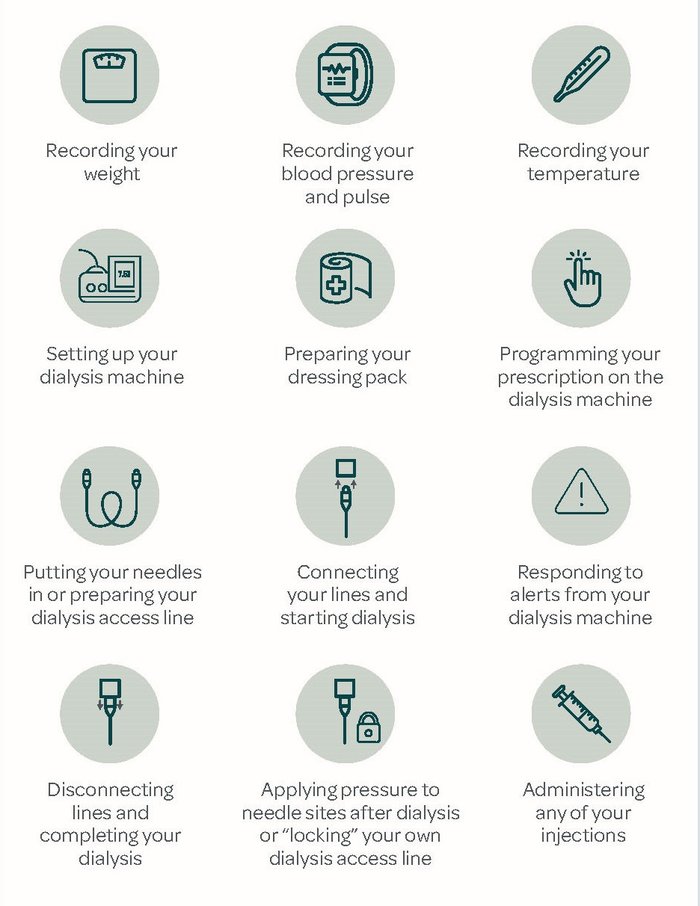Shared haemodialysis care is a recommended way of working for dialysis units. It gives you the opportunity to take part in any aspect of your dialysis treatment, with guidance and support from nursing staff.
You can choose which aspects of your care you would like to manage. This can range from small tasks, such as taking your own blood pressure and weight, to any (or all) of the other dialysis tasks. The emphasis is on taking part and feeling involved at a level that suits you as an individual.
You choose your level of participation, anywhere between complete assistance to fully self-caring.
What aspects of my care can I take part in?
This can vary depending on your treatment and where you want to start, but can include:

How can shared haemodialysis care help me?
Being involved in your treatment can help you feel more in control. Patients who have been involved in shared haemodialysis care say:
I feel more confident and in control
I experience less discomfort if needling my own fistula
I am less dependent on others
I am occupied so that waiting to start dialysis is less of a problem
I feel more positive, have a greater sense of purpose and an improved quality of life
I better understand my condition and became an expert in my own care
Is shared haemodialysis care compulsory?
No. Patient choice is central to shared haemodialysis care. You can do as many or as few tasks as you like, or none at all if you wish.
Is it safe for me to do what the trained nurses do?
Yes. Your kidney team will train you to do the tasks you choose and check you are competent and confident before you do anything on your own. You may be given a training record to complete with the nursing staff for each task that you choose to do. Staff will always be around for support and guidance, or to carry out the task if you do not want to, or are unable to complete it.
What if I don’t like needles?
You will not have to do anything you are uncomfortable with. There are lots of other tasks to choose if you don’t want to needle your fistula.
Will I have to go home to dialyse if I learn everything?
No. You can move to home dialysis if you wish, but you can also choose to stay on the dialysis unit. Talk to your kidney team about your options.
If I can dialyse myself, will I be left on my own on the dialysis unit?
No. You will always be supported by the nursing staff if you choose to stay on the dialysis unit.
What will nursing staff do if I take over some of my care?
The nursing staff will be supporting you with your other care needs, such as helping you to understand your kidney disease and how you can feel better on dialysis. They will always be there in case you are not feeling well, or change your mind about shared care.
What if feel unwell or don’t want to do shared care sometimes?
Shared care is a partnership between you and your kidney team. It is important that you tell staff how you are feeling so they can support you if you do not feel well. Staff will always be there to manage your care if needed.
Can I change my mind?
Yes. It is entirely your decision to take part in shared care, as well as how much you want to do.
How do I get started?
Ask your nursing team about any parts of your treatment that you would like to find out more about. You can learn to do as many of the tasks as you wish and can learn them in whatever order suits you best. As you learn and become more confident, you and your nursing team will decide when you are experienced enough to safely carry out the procedures yourself.
Sometimes your kidney team will be able to actively teach you how to do certain tasks. Other times, you can learn from watching other patients, or asking staff to explain what they are doing as they work.
For example, if you want to learn how to prepare your dialysis dressing pack, you might start with asking where to collect the equipment from.
The next time you come in for dialysis, you could collect the equipment yourself and a member of staff could show you how to open it. The next step might be to practise laying out the equipment. Learning how to prepare your pack then becomes an easy and achievable task for you to do.
Where can I find more information?
Read the National Institute of Health and Care Excellence (NICE) guidelines on Shared decision making.
Shared care and the learning involved in doing this has given me a better understanding of dialysis and allows me to have overall control of my condition. I actually feel that I can control it, rather than it controlling me. I would encourage dialysis patients to give shared care a go, as this better understanding and control has improved my overall wellbeing.Shared care patient Gerry
Shared haemodialysis care: download Kidney Care UK's information leaflet
You can download our Shared haemodialysis care leaflet for free.
You can also order a printed copy of Kidney Care UK’s Shared Haemodialysis care leaflet to be sent to you in the post.

Publication date: 02/2024
Review date: 02/2027